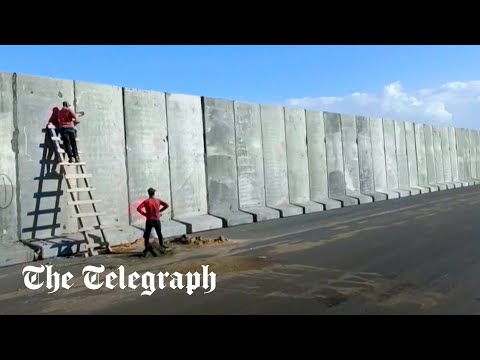Satellite imagery and video footage have emerged suggesting that Egypt is building what appears to be a large, concrete-walled enclosure which observers believe will be used to manage a major influx of Palestinian refugees flooding out of Gaza via the Rafah crossing on its eastern border.
As Israel’s planned military assault on the city of Rafah edges ever closer, it presents the Egyptian president, Abdel Fattah al-Sisi, with a potentially serious problem. The displacement into his country of potentially hundreds of thousands of Palestinians from the afflicted enclave could seriously destabilize what is an extremely fragile political environment.
For Egyptians, the potential for spillover of the Gazan conflict is a major concern. Plagued with Islamist groups mounting regular attacks on Egyptian military installments in the Sinai Peninsula since 2013, the last thing Sisi needs are enormous numbers of displaced and traumatized refugees.
Yet, with the Palestinian death toll now approaching 30,000 – approximately 70% of whom are reported to be women and children – and Israel planning on invading Rafah, where upwards of a million Palestinians are huddled, the prospect of refugees spilling into the Sinai looks more and more likely.
Sisi has roundly condemned Israel’s military assault on Gaza, and is fully aware of the humanitarian catastrophe unfolding just across the border. But two key issues are deterring him from making any hasty altruistic decisions in support of desperate Gazans fleeing hostilities.

For a start, Egypt is in no position to absorb large numbers of Palestinian refugees. Besides dealing with a decade-long insurgency in the very border areas that would have to host the refugees, the strong presence of Islamist groups ideologically close to Hamas and the Muslim Brotherhood would be very dangerous, given his unpopularity at home.
Despite winning the election in December 2023 with a reported 90% of votes, the ballot was widely seen as the most flawed to date. Opposition leaders were arrested and anyone criticising Sisi faced censure.
Accepting an influx of Palestinians, many of whom would be supportive of Hamas, could be hazardous for Sisi. Especially so given his brutal suppression of the Muslim Brotherhood since the 2013 military coup which ousted the then-president and Muslim Brotherhood leader, Mohamed Morsi.
Compounding this is Egypt’s broken economic model. It is now the second-largest debtor to the International Monetary Fund (IMF) and is currently in talks to increase its loans.
Unemployment has sat at 7% for nearly a decade and as of the end of 2023, inflation was a staggering 38%. Egypt has neither the political will nor the economic capacity to handle a mass displacement of Gazan refugees across its border.
Egypt can help
But it is possible that, with enough international support, Egypt could be persuaded to offer sanctuary, whether short-term or for a longer period, to displaced people from Gaza.
It has done similar before in a different context – last year, in return for 21 million euros (US$22.7 million) in funding from the European Union, Egypt took in 200,000 people fleeing violence in Sudan. The deal aimed to prevent migrant flows from reaching Europe.
Sisi could secure a deal on a similar premise, using the Gaza conflict in return for help from Europe or the US to deal with Egypt’s deteriorating economic situation. But this is not a sustainable solution.
Temporarily, more refugee camps could be provided. But given the damage to Gaza after Israel’s ground assault, the permanent settlement of these displaced people would need to be considered. It’s highly unlikely that Sisi would be prepared to accept this.
The ‘day after’
Sisi is not the only leader thinking of the “day after” – although, as the Rafah invasion presently scheduled for Ramadan edges ever closer, the problem looms ever larger. The US president, Joe Biden, has spoken about the need for the Palestinian Authority to be revitalized to facilitate negotiations for a new two-state solution for Israel and Palestine.
Although it’s difficult to foresee amid the trauma and violence among both populations, this long-term plan is something that Egypt could play an instrumental role in. Its intelligence services are known to have significant knowledge of the Hamas tunnel system, and it has been reported that many Egyptian army personnel are involved in the smuggling economy in Gaza.
Meanwhile, Egypt’s longstanding position on Palestinian statehood, its decades-long normalization of relations with Israel, and its more recent reset of relations with pro-Brotherhood states such as Qatar (host of much of the Hamas leadership) puts it in a unique position to foster a plan for a two-state solution.
In December, Egypt and Qatar collaborated to develop a plan for a ceasefire, contingent on phased hostage releases and prisoner exchanges. While this plan broke down fairly quickly through Israeli intransigence, it could be a model to build on for an eventual end to the conflict.
If there is no sustainable ceasefire, Egypt faces the prospect of having to take on the responsibility of hundreds of thousands of displaced Palestinians. The Egyptian public, which is largely sympathetic to the plight of the Palestinians, is likely to accept refugees on a temporary basis to prevent the humanitarian catastrophe from getting worse than it already is.
But Sisi will need to make some serious decisions for the long term or the bloody Israeli-Palestinian conflict could have dire consequences for his own country.
Gillian Kennedy is Lecturer in Politics and International Relations, University of Southampton
This article is republished from The Conversation under a Creative Commons license. Read the original article.


